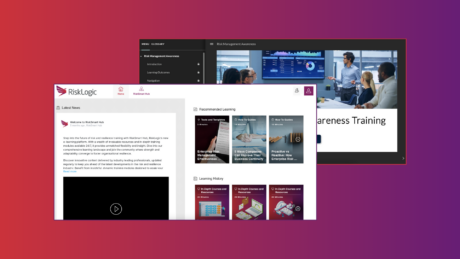-
Url copied to clipboard.
Last year (as in five days ago) I broke my flying record, well I smashed it actually. 120 flights in 12 months. That’s on average 3 a week. There is no denying it, as a business Risklogic and the resilience landscape is booming. Our New Zealand client base grows bigger by the month. As a passionate triathlete, in particular Ironman triathlons, those numbers don’t stack up.
Prior to becoming a platinum flyer (it’s not as glamorous as it sounds) I was fit, motivated and available to race. When I say race, I mean race. For me, taking part in an Ironman is about racing, I want to go as fast as I can and finish as far up my age group as possible. For those of you that don’t know, an Ironman consist of a 3.8km open water swim, 180km time trial bike ride (individual) and a standard marathon, 42.2 km. It takes about the same amount of time as your standard Monday morning scrum meeting does. A hard day at anybody’s office. To “race” an Ironman you need to train, and train a lot. Prior to being a senior Consultant at Risklogic that was possible. In a previous life, I had the work life balance spot on…or did I?
What a hundred and twenty boarding passes look like.
Before I relocated to work in Australia, I had a role that allowed me to rock up at 8.30am and leave by 4.30pm. Perfect for fitting in my training. Training to race at IM means putting in about 20 hours a week at peak times, which normally meant 15km in the Pool, 300-400km on the bike and running close to 80-100k each week for 9 months, including gym work and stretching – but whose counting? It was tough, but I could do it. For years I have worked with and helped people with their training programs through coaching and some personal training. I have always preached that there is no excuse for not finding the time in anything you do. All you need is 20 minutes a day to stay in shape and that goes with business too. 20 minutes a day to reflect on what you do and why you do it. We can all find that right?
I can still hear myself saying that and I think, what an idiot, shut up will you, I’m too tired. It’s just too hard man.
Flying really does take it out of you. Up until recently, my weekly commute was to Sydney from Christchurch. The 6 a.m red eye out of Christchurch meant a 4 a.m alarm call (2 a.m Sydney) and a full day work ahead of me. By 4 p.m I was done, too tired to focus on my work never mind go to the gym. My work life balance is messed up right? Wrong. Work life balance, in my opinion, is balancing the situation you are in right now with the life you want to have.
I love what I do at Risklogic, I’m good at it, I’m an awesome facilitator (not my words!) so I need to adapt my other life, my out of work life. Why? Well when I could train 20 hours a week I wasn’t happy in my job, I was bored. To get that work-life balance you have to get them both right (that’s why it’s called balance, right?). Sure, I probably need to fly less next year (Boss!) but it’s so easy to go, “well it’s not my fault I can’t race”, its work. Music to Risklogics ears you might think, or to an employer who didn’t care, but they do and that’s what hits home the most. I have to find a solution, I have to race again and at the end of the day that’s down to me. I love this job but I love to race, I need to work it out. Now, imagine that my racing is your family time, or your golf or your cooking…you see the trend we’re setting here?
I believe you can have both, but I believe you have to work hard to achieve that. We all like to moan that we work too hard and we probably do, but the day the smartphone and WiFi came along, the work day had no end to it. As a Crisis Management Consultant, I help clients to be resilient and find a solution for when things stray for the normal. My last article on the New Zealand Earthquakes for example, it was around 5/6 a.m that I began checking in on clients. If my work life balance is off normal then I need to find a solution, I need to make it work. Of course, I could get another job, one that lets me finish at 4.30 p.m, but I would probably be bored and probably wouldn’t be able to fund my sport either. Lycra don’t come cheap!
So going into 2017 I’ve decided I will race again, I will find the time to train, I probably need to fly less, but I have to find a way. My work life balance needs to be adjusted, adjusted to my current situation.
How am I going to do this?
- If you’re like me, a lot of overachievers develop perfectionist tendencies at a young age when demands on their time are limited to school, hobbies and maybe an after-school job. To me, it was the Army. There is no escaping your Regimental Sergeant Major. It’s easier to maintain that perfectionist habit as a spotty teenager, but as you grow up, life gets more complicated. As you climb the ladder at work and as your family grows, your responsibilities mushroom. Perfectionism becomes out of reach, and if that habit is left unchecked, it can become destructive. The key to avoiding burning out is to let go of perfectionism. “As life gets more expanded it’s very hard, both neurologically and psychologically, to keep that habit of perfection going.” The healthier option is to strive not for perfection, but for excellence and I realised this when my clients let me know where I was at!
- When my son was nine or ten years old, it was me showing him how to use Word and log in to the internet…the safe internet that is. Nowadays the role has completely reversed and I’ve realised it’s almost impossible to keep up with how technology is advancing. In the last three years though, I’ve noticed that technology can help your productivity immensely, but it can also control the way you live your life. In the late 90’s, you’d go home at 5:30pm and that would be it for emails, in 2017, your emails follow everywhere. I’ve learnt that at 6pm I turn my phone off, I close emails and I speak to my wife about her day. This is going to happen when I start training too. “OK, 5:30 is approaching, I’ve got a big 20k run coming up – better put my out of office on!”
- “A growing business requires full attention”. Really? Your clients are the most important thing in your life right? Wrong. You’re nothing to them if you’re not healthy and prepared. Getting a 2am flight to go and present to them for four hours is ridiculous! Having an afternoon flight the day before followed by a 10k run down the Sydney harbour is what I need, they’ll get the presentation of a lifetime! And you know what I figured out only recently? Your client takes more time off than you do! They lunch, they take holidays, they leave at reasonable times of the day, so don’t burden yourself thinking they’re waiting for you to always be available – we’re all human.
- Ask for help. If you’re like me, a male who was raised in a military family, asking for help is like cutting gold with a toothbrush – you look like a fool and no one understands why you’re doing it. But you have to bite the bullet! If I know for a fact that two of my colleagues are available, let alone juniors eager to learn, I should be asking for their help and getting those deadlines done before 5:30pm. Three consultants on one project is the equivalent of the 2015 Rugby world cup, over before it even started (Go All Blacks!). Marianne O’Connor, CEO of Sterling Communications, a 25-employee company with offices in Silicon Valley and Seattle, has always had a hectic work schedule. She and her husband—the CEO of another company—have juggled jam-packed work schedules along with taking care of their two children and three pets for years. She’s sometimes had to make difficult sacrifices, once being “reduced to tears” when she missed a school play her daughter was in because she was travelling to London for work. But a few years ago, when her daughter got very sick and needed ongoing medical attention, O’Connor had a wake-up call. “When you have a child who suddenly becomes very ill, it’s like nothing you’ve ever experienced … the sheer number of doctor appointments and emergency room visits.“ O’Connor says the experience was life-altering and changed how she approaches running her company and managing her personal time. Though her daughter is better now, O’Connor says the two-and-a-half years of intense health issues taught her to take a step back with her work schedule and make family and personal time a priority. She doesn’t fill up her weekends with errands but instead tries to spend quality time with the people who matter most.
- Being happy is the priority. I know that’s so obvious to everyone on planet earth but you have to ask yourself, what are you doing to achieve that? If your job is part of that like it is mine, is there a percentage left over? Last week I kayaked the Waimakariri River in New Zealand over 6 hours and 50k+ in blistering heat. I did this with a very close family friend who used to play rugby with the great Jonah Lomu. I had something to prove! It was tough but it was 6 hours away from work, being active and being under the great NZ sun. I’d say the happiness gained from that one will keep me going a good month or so!
So, what are your next steps for a work-life balance?
Until next time, plan, do, check & act…




